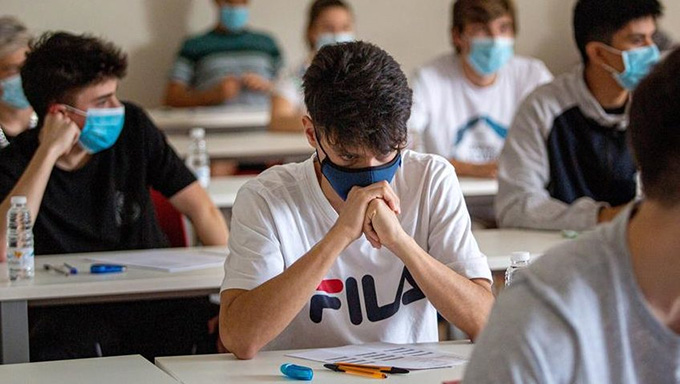
In just over a month and a half our high school graduates will face the Evaluation Tests for University Access ( EvAU ), the old selectivity. But this is a very special selectivity because it corresponds to those who we can call high school graduates “pandemials”.
These are students who have completed high school between September 2019 and May 2021 with 70% of their training in the extraordinary conditions of schooling that this time of very serious health crisis has imposed – total closure of schools, teaching alternating physical presence and the virtual or completely virtual classes.
A reflection on the consequences of this schooling in a pandemic, its possible consequences and measures to address some of its negative effects is pertinent.
UNESCO has just published a report that reveals that during this time more than 800 million students (more than half of the world’s student population) are still undergoing special schooling circumstances.
In some cases, with a total closure of schools (31 countries) or with a reduction in hours (48 countries). The specific situation in each country can be followed on an interactive map provided by the report itself.
Great effort to reduce school closings
This evolution allows us to conclude, however, that, to date, a great effort is being made by all countries to reduce the total closures of schools (which affected 190 nations at the beginning of the pandemic and that right now it only occurs in 30 countries) in favor of partial closures or only in some areas with high cumulative incidence.
The situation, as forecast in our last article on this , has improved. Today schools are fully open in 101 countries. Of course, following strict health safety protocols: interpersonal distance, bubble groups, use of masks, permanent ventilation of spaces, absence of activities with physical contact, use of disinfectant gels, temperature measurements, regular cleaning of teaching spaces …
The work of teachers and management teams to make schools a Covid-19 free place has been commendable and the whole of society should be grateful for it. Especially because it has been carried out without the regulatory clarity or the stability of criteria that would have been necessary.
They are not being great sources of contagion
Today it can be said, without fear of being wrong, that schools have not been major sources of contagion of the virus (as are social and family gatherings or illegal parties , where hundreds of people gather without a mask or safety distance in closed spaces).
On the other hand, it is logical to think that vaccination strategies still improve the data on infections and that the specter of school closures is completely removed. Probably, throughout the next academic year (perhaps not in September, but starting in the second quarter) the situation will be normalized or very close to being that of before the pandemic.
But it is unavoidable to state that these high school “pandemials” have suffered from a school situation that, due to its special nature, will deserve special attention. For the philosopher, essayist and pedagogue Gregorio Luri , for example, the performance will be lower among the “pandemials” and this will lead to a “blemish” on his record.
Learning deficits in high school
Referring to the Spanish Baccalaureate, it is evident that the lack of socialization and the absence of a classroom relationship can generate significant learning deficits; It is also true that many students did not follow the online classes properly and that blended attendance has varied between public and private centers and between different autonomous communities.
This leads some to think of inequalities in the face of a test that precisely seeks to harmonize the opportunities of all (regardless of the center where they have completed the Baccalaureate) in relation to their possibility of accessing higher education.
But we do not share a vision of so much pessimistic radicalism, much less that it is possible to speak of “stain” as if the situation were an irredeemable original sin.
Keep in mind that the circumstance has not been chosen by the students. And, most importantly, in the framework of lifelong learning , the learning process should not be terminated at one point in time.
We are in time to improve results
Of course, the situation calls for taking exceptional measures into account, but everything is, of course, recoverable. We still have time to offer, before EvAU, mass reinforcement classes.
Nothing prevents us from thinking that in the last two weeks of May periods of intensive tutorial follow-up can be established to cover the gaps that the students may present in particular.
You can also consider delaying testing. It would not be irrational to give this year’s students more time to prepare and celebrate EvAU later. Every student in these circumstances knows that three more weeks to prepare can be a world.
And, once the tests have been passed, the universities will have to anticipate the possible deficits of this generation with bold measures such as delaying the start of the course and programming intensive preparatory modules for the most significant subjects of each career, which would avoid the possible failure that some they are predicting in our future college students.
In any case, it is necessary to reinforce the support and orientation of these high school graduates “pandemials” who are victims and not responsible, let us not forget, of their complicated situation.
Author Bio: Javier M. Valle is Director of the Research Group on Supranational Educational Policies at Autonomous University of Madrid
